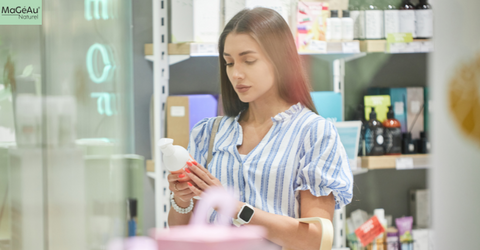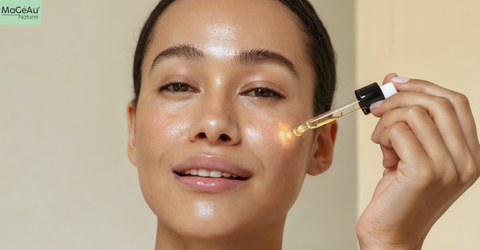In recent years, there has been a growing awareness about the ingredients in our cosmetics and skincare products. While these items promise glowing skin and luscious hair, many of them come with hidden risks. Ingredients like parabens, sulfates, and silicones are common culprits in many personal care products, but are they as harmless as they seem? Let’s break down why these ingredients might be causing more harm than good, not only to your health but also to the environment.
Parabens: What’s the Big Deal?
Parabens are preservatives commonly used in cosmetics to extend shelf life by preventing bacterial growth. Sounds great, right? Not quite.
Here’s the issue:
1. Hormone Disruption: Parabens mimic oestrogen, a hormone that regulates many body functions. Over time, exposure to parabens can disrupt your endocrine system, leading to potential health issues such as hormonal imbalances, fertility problems, and even an increased risk of breast cancer.
2. Cumulative Exposure: Most people use multiple products daily, from moisturisers to shampoos, all containing parabens. This cumulative exposure can amplify their harmful effects over time.
3. Hidden Labels: Parabens often go by different names, such as methylparaben, ethylparaben, or propylparaben. Many consumers are unaware they’re using products containing these harmful chemicals.
Sulfates: Not as Innocent as They Seem
Sulfates, like sodium lauryl sulfate (SLS) and sodium laureth sulfate (SLES), are common in shampoos, cleansers, and toothpastes. They create that satisfying lather we all love.
But here’s what they’re really doing:
1. Skin Irritation: Sulfates strip your skin and scalp of their natural oils, leading to dryness, irritation, and in some cases, eczema.
2. Hair Damage: For those with coloured or textured hair, sulfates can be especially harsh, leading to frizz, breakage, and faded colour.
3. Environmental Impact: Sulfates don’t break down easily in water. Once they wash down the drain, they can harm aquatic life and disrupt ecosystems.
Silicones: Smooth on the Surface, Problematic Underneath
Silicones are used in hair and skincare products to provide a silky, smooth finish.
But their benefits are often just superficial. Here’s why:
1. Clogged Pores: Silicones create a barrier on your skin, which traps dirt, oil, and other impurities. This can lead to acne and dull skin over time.
2. Build-Up: In haircare, silicones can coat your strands, causing build-up that makes your hair look lifeless and greasy.
3. Non-Biodegradable: Silicones are synthetic and do not break down easily. This makes them harmful to the environment, as they accumulate in water bodies and soil.
The Better Alternatives: Choosing 100% Natural and Eco-Friendly Products
If these ingredients sound alarming, there’s good news: you don’t have to compromise on quality or results. By opting for products that are 100% natural, cruelty-free, and eco-friendly, you’re not only protecting your health but also the planet.
1. Why Choose 100% Natural? Natural ingredients like aloe vera, magnesium, and shea butter are gentle yet effective. They nourish your skin without harmful side effects. Plus, they’re biodegradable, making them safe for the environment.
2. Cruelty-Free Matters: Many products with parabens, sulfates, and silicones are tested on animals. Switching to cruelty-free cosmetics ensures no animal suffers for your beauty routine.
3. Eco-Friendly Cosmetics: These products focus on sustainable sourcing and minimal packaging. Brands that prioritise eco-friendly practices help reduce pollution and waste.
4. Sustainable Skincare: Sustainable skincare uses ingredients that are kind to your skin and the planet. Think organic farming, recyclable packaging, and no harmful chemicals.
Less-Known Facts: What Most Consumers Don’t Know
1. Hidden Ingredients: Many brands market their products as “natural” or “organic” but still include small amounts of harmful ingredients. Always check the labels.
2. Long-Term Effects: The damage caused by parabens, sulfates, and silicones isn’t always immediate. Many health issues, like hormone-related problems or chronic skin conditions, develop over time.
3. Environmental Costs: These ingredients don’t just harm your body. Parabens have been found in marine life, sulfates pollute water, and silicones contribute to landfill waste. By choosing eco-friendly products, you’re contributing to a healthier planet.
4. Misleading Marketing: Some brands use terms like “paraben-free” while including other synthetic preservatives. Similarly, “sulfate-free” doesn’t always mean the product is free from harsh surfactants.
How to Transition to a Safer Routine
Switching to 100% natural, eco-friendly, and cruelty-free cosmetics can feel overwhelming.
Here are some tips to make the transition easier:
1. Start Small: Replace one product at a time. Begin with items you use daily, like moisturisers or shampoos.
2. Read Labels: Educate yourself on harmful ingredients and look for certifications like “Certified Organic” or “Cruelty-Free”.
3. Support Ethical Brands: Look for brands like MaGéAu Naturel who prioritise transparency and sustainability. Many companies now highlight their eco-friendly and cruelty-free credentials.
4. DIY Options: For those who love a bit of experimentation, DIY skincare recipes using natural ingredients like honey, oats, and essential oils are a fun and effective alternative.
Closing Thoughts: Protecting Your Health from Harmful Ingredients
Your health and the environment deserve better than the risks posed by parabens, sulfates, and silicones. By choosing 100% natural, cruelty-free, and eco-friendly skincare and cosmetics, you’re making a conscious decision to care for yourself and the planet. With sustainable skincare, you can achieve radiant results without compromising your values or well-being. Isn’t it time to make the switch?





Comments (0)
There are no comments for this article. Be the first one to leave a message!